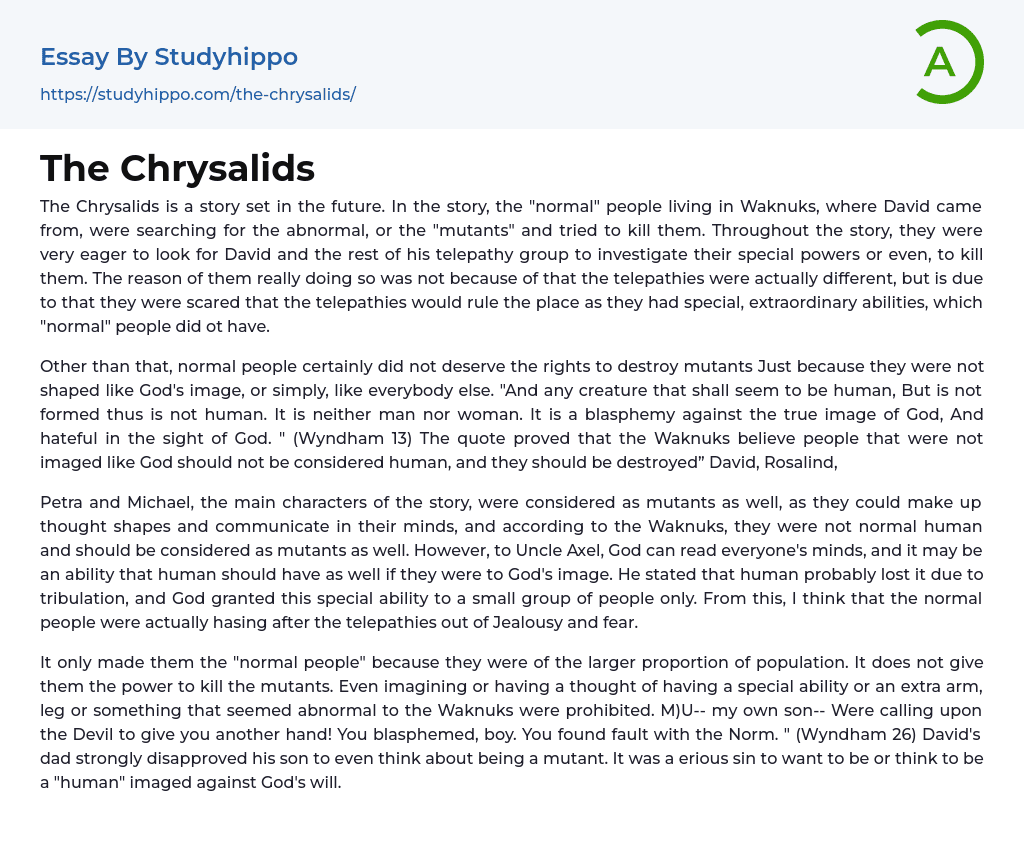The Chrysalids is a futuristic story that focuses on the lives of "normal" individuals in Waknuks, David's hometown. These people actively hunt and try to eliminate "mutants" or those who are considered abnormal. The main target of their search is David and his telepathy group, as they pose a threat with their unique powers. The motivation behind this relentless pursuit lies not only in the fact that the telepaths are different, but also in the fear held by the "normal" population that these individuals will gain control over the area due to their extraordinary abilities, something that ordinary people lack.
Normal individuals did not have the rights to eliminate mutants solely based on their different appearance compared to what is considered God's image or the norm. The Waknuks firmly believed that individuals who did not fit this image should not be classified as h
...uman, and therefore, should be eradicated. David, Rosalind, and others faced this unjust judgment and discrimination.
Petra and Michael were both deemed mutants because they possessed the extraordinary ability to form thought shapes and communicate telepathically. The Waknuks viewed them as abnormal humans who should be categorized as mutants. However, Uncle Axel held a different perspective, believing that God possesses the power to read everyone's thoughts. He argued that this telepathic ability may have been lost by humans during the tribulation, and that God selectively granted it to only a small group of individuals. This led me to conclude that normal people, driven by jealousy and fear, were actually coveting the telepaths' unique gift.
In Waknuk, being considered "normal" only meant belonging to the majority population. However, being "normal" did not
grant individuals the authority to harm mutants. The inhabitants of Waknuk were strictly forbidden from entertaining thoughts of possessing any sort of special ability or physical abnormality, such as an extra limb. David's father vehemently condemned his son for even considering the idea of being a mutant, equating it to summoning the Devil and defying God's intentions.
The mistreatment and discrimination of mutants by the Waknuks is evident. Merely possessing physical or mental disabilities or deviating from the appearance of a "perfect" human does not justify the unjust treatment they endure. The act of condemning all mutants to reside in the radiation-filled Fringes, where living conditions are poor, is entirely devoid of humanity. The Fringes, due to its higher radiation levels, often leads to deviations among its inhabitants. Additionally, the Waknuks perceive the Fringes people (mutants) as a threat, with their raids in civilized areas to procure food further reinforcing this belief.
Parents use fabricated narratives to frighten and discipline children, warning them about the fringes consuming humans. I believe these tales primarily emerge from fear of mutants and their distinctiveness. The "old people" who experienced the Tribulation feared its severe divine punishment would recur, leading them to diligently follow every commandment in the Bible as an act of obedience to God's will.
Nevertheless, I oppose the destruction or discrimination of mutants as it goes against biblical teachings that condemn killing and hatred. The narrative includes Sophie, a friend of David, who is labeled a mutant because of her physical abnormalities. Despite appearing normal to others in her life with her parents, David's accidental revelation of Sophie having 6 toes created fear within her family
due to societal norms.
The Waknuks' decision to escape out of town is evidence of their closed-mindedness and unwillingness to accept mutants. Consequently, I believe that the discriminatory actions by the Waknuks are a significant error. While their religious beliefs may have influenced this behavior, it was unnecessary to harm or isolate the mutants in the Fringes. The Waknuks must understand that disabilities are not sinful or evil. It is crucial for mutants to receive education and become more open-minded, similar to ideal 1B learners.
- Age Of Enlightenment essays
- Ethos essays
- Time essays
- Acceptance essays
- Meaning Of Life essays
- Reality essays
- Natural Law essays
- Political Philosophy essays
- Utilitarianism essays
- Existence essays
- Free Will essays
- Good And Evil essays
- Confucianism essays
- Relativism essays
- Conscience essays
- Environmentalism essays
- Empiricism essays
- Epistemology essays
- Ethics essays
- Existentialism essays
- Human Nature essays
- Individualism essays
- Metaphysics essays
- Philosophy Of Life essays
- Transcendentalism essays
- Truth essays
- Destiny essays
- Determinism essays
- Fate essays
- Functionalism essays
- Philosophers essays
- Pragmatism essays
- Future essays
- Child Observation essays
- Critical Reflection essays
- Teaching Philosophy essays
- Personal Philosophy essays
- Action Speak Louder Than Words essays
- Can Money Buy Happiness essays
- Values of Life essays
- Ethical dilemma essays
- Normative Ethics essays
- Virtue Ethics essays
- Belief essays
- Deontology essays
- Moral essays
- Virtue essays
- Work Ethic essays
- Henry David Thoreau essays
- Carl Jung essays




